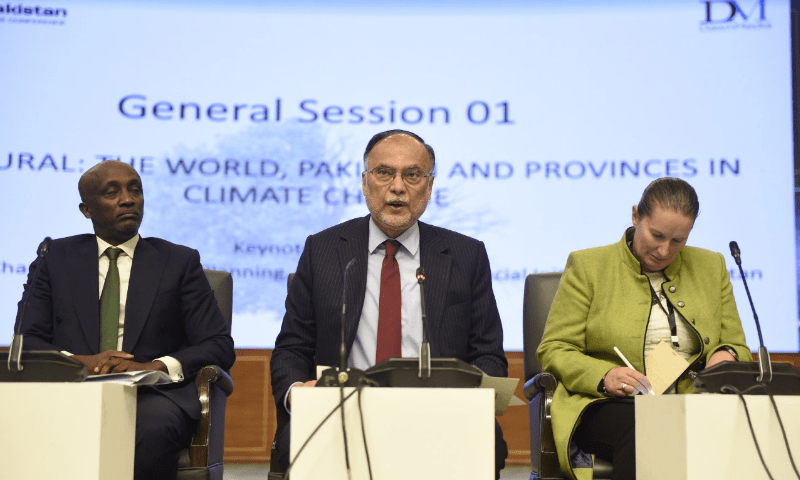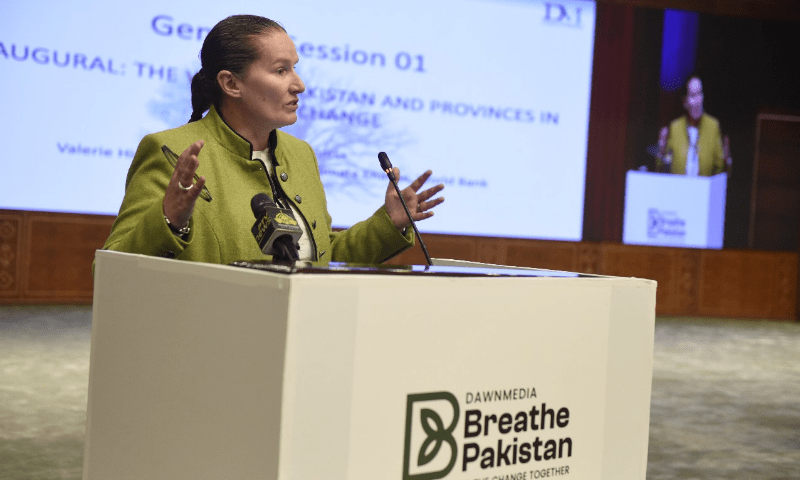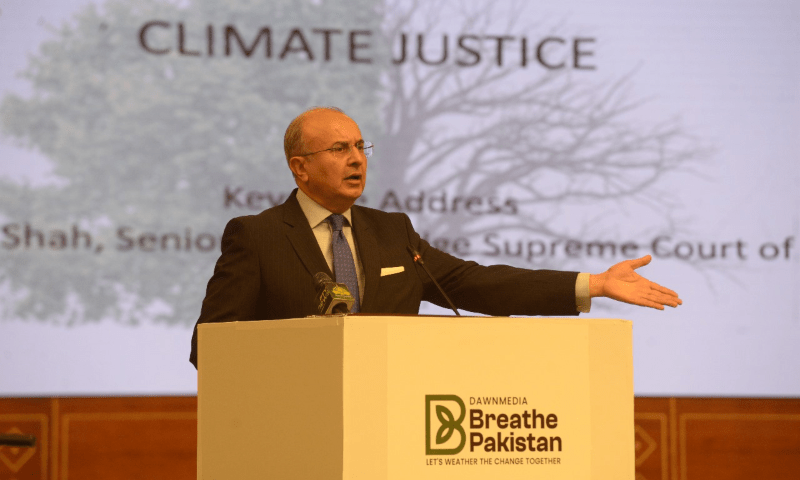ISLAMABAD: Leaders and climate experts weighed in their insights during a moot on climate change, pointing out that it is not just an environmental problem but an economic one. They stressed that models have revealed that Pakistan is at the risk of losing seven to nine percent of its economy by 2050.
Addressing the opening session of Breathe Pakistan Conference helmed by Dawn Media Group, Planning Minister Ahsan Iqbal, UN Resident and Humanitarian Coordinator Mohamed Yahya and Global director for climate change at the World Bank Valerie Hickey spoke about the perils of climate change and steps being taken to curb it. Chief Minister Khyber Pakhtunkhwa Ali Amin Gandapur and Senior Puisne Judge Supreme Court of Pakistan Justice Mansoor Ali Shah also addressed the sessions.
Speaking about the lasting damage done by smog, planning minister said that it was not just a national concern but a cross-border challenge: “It’s affecting millions of crops across south Asia. We need joint action and shared investment to deal with it.”
Iqbal reiterated that despite contributing less than one percent of global carbon emissions, Pakistan stands amongst the most affected countries, has formulated a National Environmental Policy to combat climate change.
UN Resident and Humanitarian Coordinator Mohamed Yahya said that global emissions continue to rise towards catastrophic temperatures: “The signs are clear and the evidence is before us. Those who come from this region, already know that droughts, floods and extreme weather events are becoming more intense and catastrophic.”

Courtesy: Breathe Pakistan
Referring to the devastating floods of 2022 that submerged one-third of the country, Yahya said that they should have been a wake up call for everyone yet emissions continue to rise: “This crisis is not the making of Pakistan. 20 countries contribute 80 percent of global emissions and Pakistan contributes just one-percent yet pays a heavy price.”
Countries like Pakistan cannot wait for the north to send them money: Valerie Hickey
Global director for climate change at the World Bank Valerie Hickey busted myths surrounding climate change pointing out that climate change is just an environmental concern: “It’s not an environmental problem. The planet will be fine; we are going through intense weather change; the planet will survive that. It’s not an environmental problem, it’s an economic problem, rather the problem is that it’s not big enough of an economic problem, yet.”
She said that as of now, Pakistan is losing about six percent of its economy to inefficient transportation, and would lose seven to nine percent in the next 25 years owing to climate change, which may not seem huge numbers right now.
Talking about the energy revolution she said there are other a trillion dollars spent every day for renewable energy, but while energy sector has taken the centre stage, it should not be the sector that should be focused rather water and agriculture should be.


Courtesy: Breathe Pakistan
“Climate finance is another myth we need to tackle. It is absolutely right that Pakistan is not responsible for the conditions as they are today, so it makes sense that the countries who are responsible for it should pay more. Morally those countries should pay.. but in truth even if they pay it’s usually in loans, not in grants. We will be giving finance to Pakistan to ensure food security but we were going to spend that in Pakistan anyway. It might have been on another development project but it would have been here — countries like Pakistan cannot wait for the north to send them money,” she said.
She said that for international public finance, it will only ever matter in terms of charity but the money needed to adapt, to build resilience needs to come from domestic private sector, and from government spending channeled into such sectors.
KP forests reduce Pakistan’s 50 percent carbon emissions: Gandapur
Chief Minister Khyber Pakhtunkhwa, Ali Amin Gandapur said that KP has 40 percent forest cover that helps in reducing 50 percent of carbon emissions.
“Under Imran Khan’s leadership, over PKR 475 billion had been invested in forest expansion, achieving international standards in afforestation. Despite forgoing over 200 billion rupees in potential revenue from timber and tourism, the government has prioritised environmental sustainability,” he said.
CM KP added that more than 175,000 jobs have been created in this sector, and future budgets will emphasise green initiatives, including the solarization of schools, hospitals, and government buildings: “These efforts not only support food security but also transform barren land into agricultural fields, aligning with the Billion Tree Project’s vision for a sustainable Pakistan.”
Delay in climate financing isn’t just a policy failure, it’s miscarriage of justice: Justice Mansoor Ali Shah
Dubbing climate change as a present and accelerating crisis, Justice Mansoor said that Pakistan is a frontline state of climate catastrophe: “We are facing severe water shortages, devastating floods, and escalating environmental disasters. The 2022 floods submerged one-third of the country, causing USD30 billion in damages, yet climate financing remains elusive. Nearly 40 percent of Pakistan’s workforce, largely in agriculture, faces uncertainty due to climate change.”
He said that experts stressed the need for climate justice, advocating for accountability mechanisms, environmental diplomacy, and a global climate court to ensure equitable solutions. Without urgent action, continued inaction on climate financing risks deepening climate apartheid for more vulnerable nations: “Citizens came to us and filed a complaint that climate change is the biggest threat to Pakistan and yet there is still no climate change authority sans a climate change fund. We worked with the government to establish it in 2017. Today there is still no climate change authority and there is not a penny in the climate change fund.”


Courtesy: Breathe Pakistan
Focusing on Islamic climate finance as a potential measure, such as waqf—a permanent endowment traditionally used for health and education, Justice Shah said that it could be leveraged for climate action.
“We need homegrown solutions rather than reliance on external aid, with recent discoveries showing cost-effective, local alternatives for projects like water treatment, which previously required billions in foreign funding,” he said.

